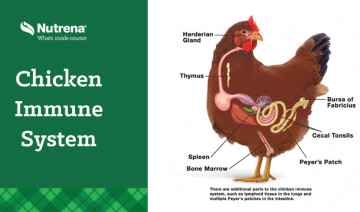
The Chicken Digestive System and Immune System: An Important Partnership
How are your chickens’ diet and their overall health connected?
Overview of Immune System
As humans, we rely on our immune systems every day to protect us from viruses, bacteria, toxins, and fungi. When this network of organs, cells, and proteins defeats a threat to our body, it makes a record of how to defend against the invader. The next time the body is faced with this particular attacker, the immune system can defeat it swiftly and efficiently.
The chicken’s immune system functions in a similar way. It is also complex. Its main defenses are lymphoid organs, which produce, store, and carry cells that fight infection. The primary lymphoid organs in a chicken are the thymus and the bursa of Fabricius:
- Thymus: This series of lymphatic lobes runs almost the whole length of the neck. It is similar to the thymus in humans.
- Bursa of Fabricius: This organ is unique to birds and is located on top of the rectum. It forms a kind of pocket (the word bursa means “purse”) that contains folds of lymphoid tissue.
These two organs produce immune cells: the thymus produces T-cells and the bursa of Fabricius produces B-cells. These immune cells migrate to other areas in the body, including the Harderian gland, spleen, and bone marrow. However, more than 60% of these immune cells migrate to and reside in the various places in the digestive tract, including the cecal tonsils and Peyer’s patches. From these locations, they defend the body against invaders.
In addition to hosting immune cells, the digestive system also contains other important components that support the chicken’s immune system. Beneficial microflora (bacteria and yeast) live in throughout the digestive tract. They provide important services, such as protecting the walls of the intestine from colonization by harmful bacteria. Scientists also think that the friendly microflora help keep the bird’s body on high alert for disease-causing organisms.
So, the immune system of a chicken includes both immune cells and beneficial microflora that are located in the digestive tract.
Benefits of a Diet That Supports the Immune System
You can help keep your chickens healthy by providing a high-quality, commercially formulated feed containing elements that are necessary for gut health. These include probiotics, prebiotics, yeast culture, and essential oils. These ingredients populate the gut with good microflora and can boost the immune system. Studies have shown that feeds formulated to boost the immune and digestive systems can result in better health and quality of life and improved egg production and quality. In addition, healthy chickens are less likely to harbor harmful bacteria in their reproductive tract, meaning safer eggs for you.
Finally, a diet that supports the immune system can increase absorption of nutrients from food by increasing the surface area of the intestine, meaning your birds will use their feed more efficiently. It also aids in digestion of calcium, which is important for strong eggshells and healthy bones.
In short, a chicken with a diet that supports a healthy immune system is a chicken that is both happy and productive, living her best life.
Support Your Chickens’ Immune Systems
Nutrena® NatureWise® Poultry feeds with FlockShield® and essential oils are specially formulated to support both the digestive system and the immune system for birds at every stage of life. They contain probiotics, prebiotics, yeast cultures, and essential oils that contribute to gut and immune system health. Choosing Nutrena NatureWise with Flockshield will help your birds live their best lives by improving their health, digestion, and productivity.
The feed room is proudly brought to you by Nutrena and Cargill Animal Nutrition. Learn more about us here. You can see the original blog post here.
